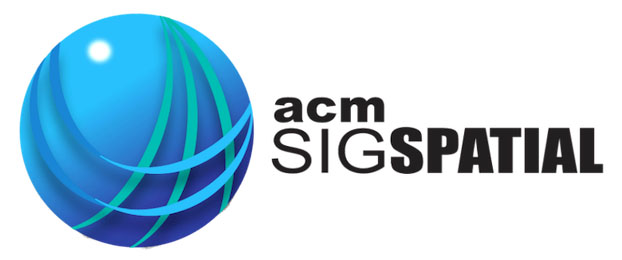Half-day Workshop - November 3, 2025 Workshop Program
- Date: November 3, 2025
- Time: 8:00 AM - 12:30 PM
- Location: Pathways
Program Schedule
| Time | Session |
|---|
| 8:00 AM - 8:20 AM | Opening |
| 8:20 AM - 9:00 AM | Session 1 (Short Papers)
1. Learning from the Storm: A Multivariate Machine Learning Approach to Predicting Hurricane-Induced Economic Losses
Bolin Shen, Eren Ozguven, Yue Zhao, Guang Wang, Yiqun Xie, Yushun Dong
2. Beyond Mode Detection: Reconstructing Detailed Transit Itineraries from Crowdsourced GPS Trajectories
Ojas Jagtap, Naman Awasthi, Mohit Jain, Saad Mohammad Abrar, Vanessa Frías-Martínez
3. Community-Centered Spatial Intelligence for Climate Adaptation at Nova Scotia’s Eastern Shore
Gabriel Spadon, Oladapo Oyebode, Camilo Botero, Tushar Sharma, Floris Goerlandt, Ronald Pelot
4. Toward Reliable Pavement Digital Twins: Multi-Scale Spatiotemporal Monitoring Challenges and Solutions
Haolin Wang, Yichang James Tsai Tsai
5. Leveraging Synthetic Telecom Data to Support the Development of Community Resilience Applications
Shih-Chun Lin, An-Syu Li, Yi-Chung Chen, Tzu-Yin Chang, Rong-Kang Shang |
| 9:00 AM - 10:00 AM | Session 2 (Long Papers)
1. ST-GraphNet: A Spatio-Temporal Graph Neural Network for Understanding and Predicting Automated Vehicle Crash Severity
Mahmuda Sultana Mimi, Md Monzurul Islam, Anannya Ghosh Tusti, Shriyank Somvanshi, Subasish Das, Xinyue Ye
2. Joint Optimization of Transit Stops and Routes to Improve Access to Essential Community Destinations
Md Gulam Kibria, Yufei Xu, Viswa Sri Rupa Anne, Naveen Eluru, Srinivas Peeta
3. AQIoT: Partnering with Community Organizations to Provide Fine-Grained Air Quality Data
Brian Krupp, Jonathon Fagert, Chentao Fan, Isabelle Zhang, Dorian Hawkins
4. Your Friends Reveal Where You Are: Location Estimation based on Friends’ Locations in Geosocial Networks
Ketevan Gallagher, Vishwanath Seshagiri, Theodoros Chondrogiannis, Panagiotis Bouros, Andreas Züfle
5. A Comparison of Travel Time Data from Open Source Routing Machine (OSRM) and Uber
Thanaa Ghanem, Punyapat Rabalert |
| 10:00 AM - 10:30 AM | Coffee Break |
| 10:30 AM - 11:20 AM | Keynote |
| 11:20 AM - 12:20 PM | Session 3 (Long Papers)
1. Agentic LLM Framework for Generating Spatial Intelligence to Support Decision-Making in Smart Cities
Yufei Xu, Gulam Kibria, Srinivas Peeta
2. Framework for Disambiguating Indigenous Place Names and SDIs for Tribal Communities
Sumit Sen, Lokendra Chauhan
3. An Algorithm for Feature Based Segmentation of Contiguous Area in a Community to Locate Underserved Areas
Subhajit Chakrabarty, Devesh Sarda, Udaysinh Rathod, Mridula Mavuri
4. Using Conditional Adversarial Generative Networks and Aerial Images to Draw Urban Intersection Markings in Different National Styles
Yang-Chou Juan, Chun-Chieh Yang, An-Syu Li, Chang-Hung Shih, Ming-Min Kao, Yi-Chung Chen
5. Spatially Aware Mixture of Propagation for Air Quality Prediction
Xiyang Hu, Hua Yan, Yu Yang |
| 12:20 PM - 12:30 PM | Awards and Closing |
Keynote Speaker
Prof. Yanjie Fu
Title
Can AI be the Copilot of Urban Operation and Design for Shaping Tomorrow’s Cities?
Abstract
As cities face rapid urbanization and the pressing need for sustainability, there is an urgent demand for advanced strategies in better land utilization, resource optimization, infrastructure development, improved equity, data-driven policymaking, as well as the better understanding of complex interdependencies between physical and virtual spaces. This talk will delve into the latest AI technologies for urban planning, and discuss major research thrusts in AI for urban planning from the geographic, human-centric, system operation, social, economic dimensions.
Short Bio
Dr. Yanjie Fu is an associate professor in the School of Computing and AI at the Arizona State University. He received his Ph.D. degree from the Rutgers University in 2016, the B.E. degree from the University of Science and Technology of China (USTC), and the M.E. degree from the Chinese Academy of Sciences (CAS). His teaching and research have been recognized by: 1) several junior faculty awards, e.g., US NSF CAREER (2021); 2) several best paper (runner-up, finalist) awards in KDD, ICDM, SIGSpatial 3) several community and industrial recognitions, e.g., 2025 2024 Stanford Elsevier World’s Top 2% Scientists; 4) several university-level awards like ASU Fulton Engineering Top 5% Teaching Recognition Award, Reach the Stars Award. His research involves two major efforts: 1) on Data for AI (D4AI), how can the structure knowledge of data guide AI? His lab has contributed projects including: D4AI-spatial, D4AI-timeseries, D4AI-causal outliers. 2) on AI for data (AI4D), how can AI augment, reprogram, and knowledgize data? Several contributed projects include AI4D-RL, AI4D-GenAI, AI4D-LLM. His recent focuses are space-time intelligence, data-centric AI, sim2decision. He also explores emerging topics on multimodal reasoning, LLM and agentic AI with his students. He currently serves as an Associate Editor of ACM Transactions on Knowledge Discovery from Data and an Associate Editor of ACM AI Letters. He is committed to data science education. Many of his graduated Ph.D. students have joined academia as tenure-track faculty members.
Headshot
Dr. Yanjie Fu – Arizona State University
Awards
- Best Paper Award
- Best Community Impact Paper Award

